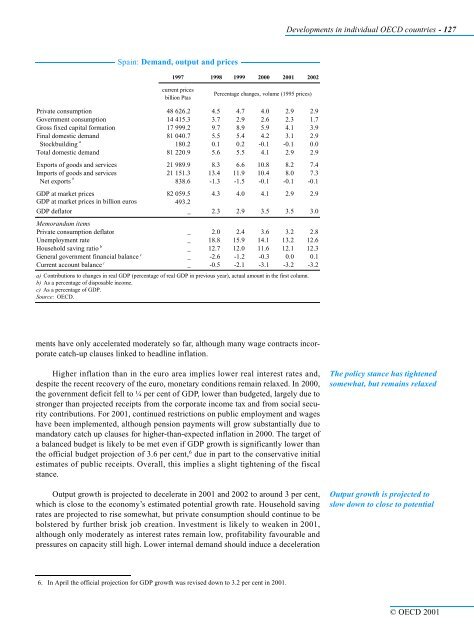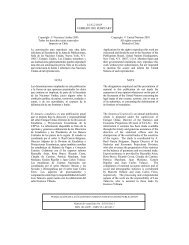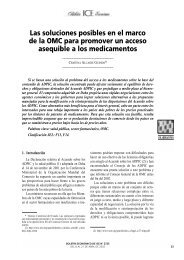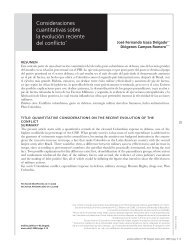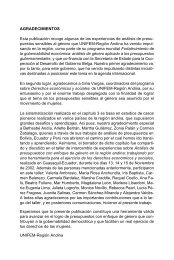OECD Economic Outlook 69 - Biblioteca Hegoa
OECD Economic Outlook 69 - Biblioteca Hegoa
OECD Economic Outlook 69 - Biblioteca Hegoa
Create successful ePaper yourself
Turn your PDF publications into a flip-book with our unique Google optimized e-Paper software.
Spain: Demand, output and prices<br />
1997 1998 1999 2000 2001 2002<br />
current prices<br />
billion Ptas<br />
Percentage changes, volume (1995 prices)<br />
Private consumption 48 626.2 4.5 4.7 4.0 2.9 2.9<br />
Government consumption 14 415.3 3.7 2.9 2.6 2.3 1.7<br />
Gross fixed capital formation 17 999.2 9.7 8.9 5.9 4.1 3.9<br />
Final domestic demand 81 040.7 5.5 5.4 4.2 3.1 2.9<br />
a<br />
Stockbuilding 180.2 0.1 0.2 -0.1 -0.1 0.0<br />
Total domestic demand 81 220.9 5.6 5.5 4.1 2.9 2.9<br />
Exports of goods and services 21 989.9 8.3 6.6 10.8 8.2 7.4<br />
Imports of goods and services 21 151.3 13.4 11.9 10.4 8.0 7.3<br />
a<br />
Net exports 838.6 -1.3 -1.5 -0.1 -0.1 -0.1<br />
GDP at market prices 82 059.5 4.3 4.0 4.1 2.9 2.9<br />
GDPatmarketpricesinbillioneuros 493.2<br />
GDP deflator<br />
Memorandum items<br />
_ 2.3 2.9 3.5 3.5 3.0<br />
Private consumption deflator _ 2.0 2.4 3.6 3.2 2.8<br />
Unemployment rate _ 18.8 15.9 14.1 13.2 12.6<br />
b<br />
Household saving ratio _ 12.7 12.0 11.6 12.1 12.3<br />
c<br />
General government financial balance _ -2.6 -1.2 -0.3 0.0 0.1<br />
c<br />
Current account balance _ -0.5 -2.1 -3.1 -3.2 -3.2<br />
a) Contributions to changes in real GDP (percentage of real GDP in previous year), actual amount in the first column.<br />
b) As a percentage of disposable income.<br />
c) As a percentage of GDP.<br />
Source: <strong>OECD</strong>.<br />
ments have only accelerated moderately so far, although many wage contracts incorporate<br />
catch-up clauses linked to headline inflation.<br />
Higher inflation than in the euro area implies lower real interest rates and,<br />
despite the recent recovery of the euro, monetary conditions remain relaxed. In 2000,<br />
the government deficit fell to ¼ per cent of GDP, lower than budgeted, largely due to<br />
stronger than projected receipts from the corporate income tax and from social security<br />
contributions. For 2001, continued restrictions on public employment and wages<br />
have been implemented, although pension payments will grow substantially due to<br />
mandatory catch up clauses for higher-than-expected inflation in 2000. The target of<br />
a balanced budget is likely to be met even if GDP growth is significantly lower than<br />
the official budget projection of 3.6 per cent, 6 due in part to the conservative initial<br />
estimates of public receipts. Overall, this implies a slight tightening of the fiscal<br />
stance.<br />
Output growth is projected to decelerate in 2001 and 2002 to around 3 per cent,<br />
which is close to the economy’s estimated potential growth rate. Household saving<br />
rates are projected to rise somewhat, but private consumption should continue to be<br />
bolstered by further brisk job creation. Investment is likely to weaken in 2001,<br />
although only moderately as interest rates remain low, profitability favourable and<br />
pressures on capacity still high. Lower internal demand should induce a deceleration<br />
6. In April the official projection for GDP growth was revised down to 3.2 per cent in 2001.<br />
Developments in individual <strong>OECD</strong> countries - 127<br />
The policy stance has tightened<br />
somewhat, but remains relaxed<br />
Output growth is projected to<br />
slow down to close to potential<br />
© <strong>OECD</strong> 2001


